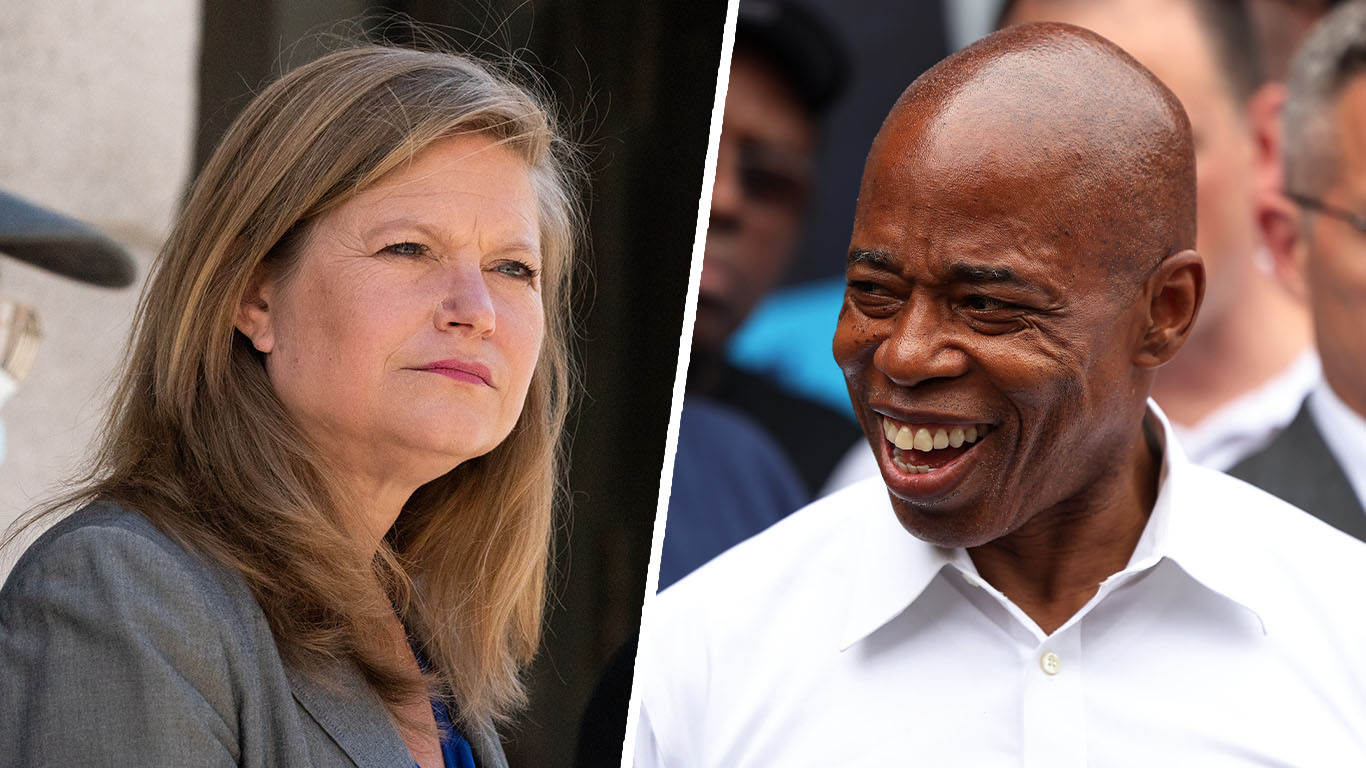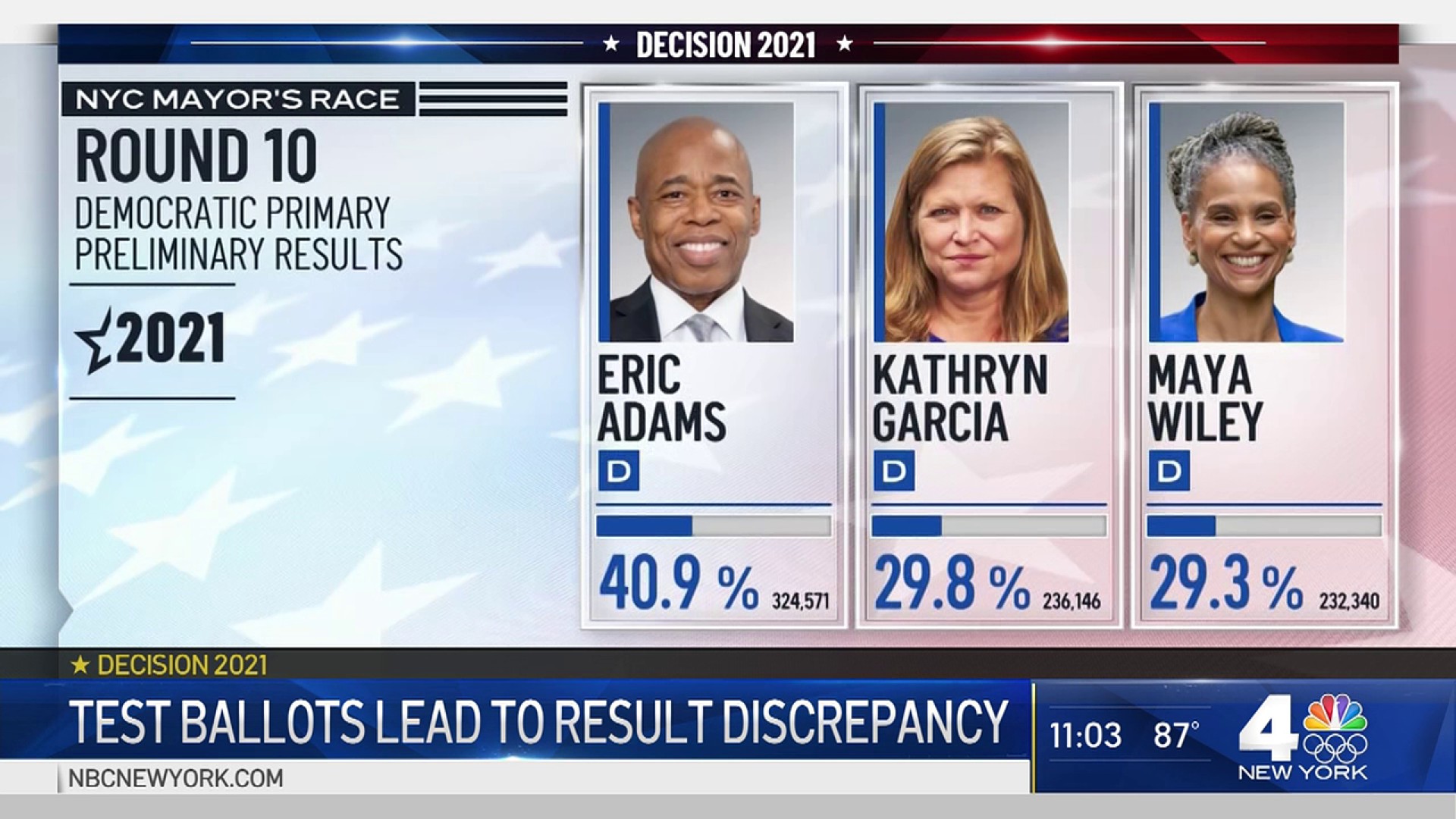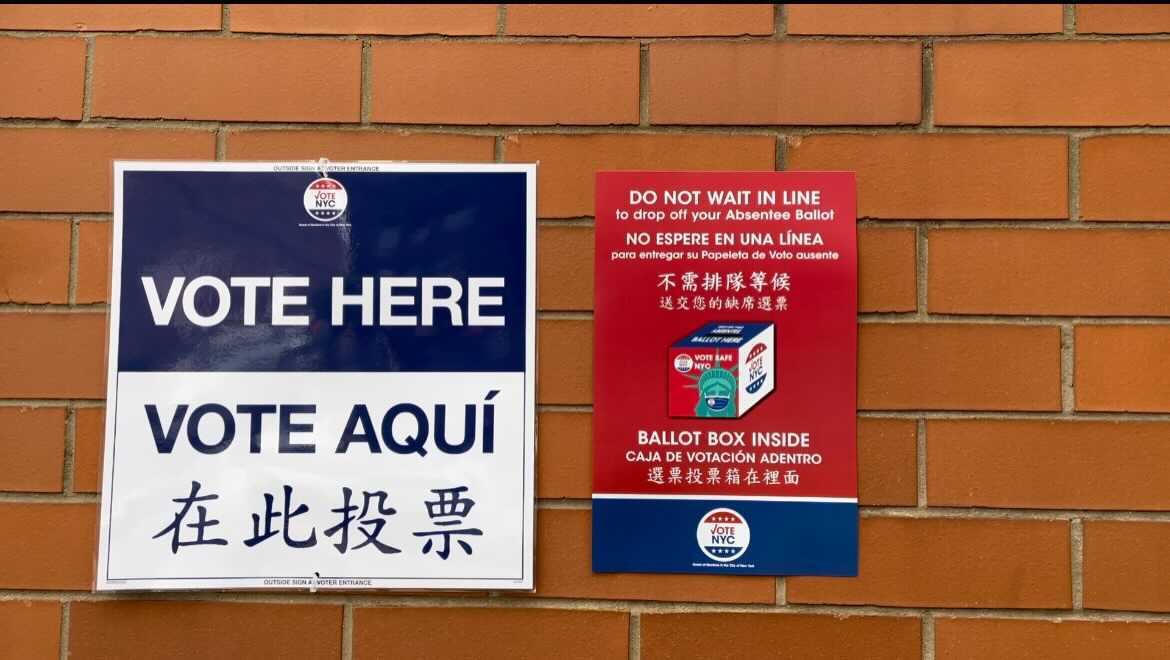What to Know
- After an embarrassing error led to false results Tuesday, the city BOE released new preliminary voting tabulations in the Democratic mayoral primary on Wednesday, appearing to show Eric Adams with a slim lead over Kathryn Garcia 9 rounds of ranked-choice voting
- After topping Maya Wiley by less than 400 votes in the previous round, Garcia falls short of Adams' total
- With or without the error, the race for the Democratic mayoral nomination is far from over, as more than 125,000 absentee ballots have yet to be counted
After a first attempt went disastrously wrong, the New York City's Board of Elections released new, unofficial ranked-choice voting results of last week's primary election showing Eric Adams still holding a slim lead over Kathryn Garcia — but that edge is even slimmer than before.
Just as in Tuesday's results, which mistakenly included 135,000 test ballots that were never cleared from the BOE's computer system, all three leading candidates received a fairly proportional number of the votes from rounds two through seven, when all other candidates were eliminated aside from Andrew Yang.
Once his ranked choice votes are redistributed, Garcia is able to leapfrog Maya Wiley for second place — but by the thinnest of margins. Garcia gained almost 36,900 votes that round, almost three times as many as Wiley, allowing her to sneak past with a difference of just 347 votes. That margin is far closer than the false numbers released on Tuesday showed.
Get Tri-state area news delivered to your inbox.> Sign up for NBC New York's News Headlines newsletter.
At that point, Adams still holds an 11-point edge over both Garcia and Wiley, but the race between the final two candidates gets far tighter when Wiley's ballots are redistributed. Garcia gained 116,800 more votes that ninth and final round, as compared to Adams' 44,300. That leaves their difference at just 14,755 (Adams' 51.1 percent to Garcia's 48.9 percent), which is also lower than Tuesday's results showed.
A crucial caveat that will likely end up being the determining factor in the race for mayor: The unofficial results released Wednesday evening do not include absentee ballots. Those 125,000 ballots won't be added to the count until at least July 6.
Adams' campaign didn't question the veracity of Wednesday's results, instead touting the candidate as "the first choice of voters on Election Day" and said they believe the absentee ballots favor him. However, Garcia has sounded confident in the past that the absentee vote would go her way. On Wednesday, she once again implored patience as the absentee ballots are counted, and said "every candidate should respect the democratic process and be committed to supporting whomever the voters have selected to be the Democratic nominee for mayor," a call echoed by Wiley as well.
As the unofficial numbers were released, the BOE released a follow-up statement apologizing again the mix-up from the day before, calling the error "unacceptable" while also saying the problem doesn't lie with ranked-choice voting itself, but rather human error.
"We have implemented another layer of review and quality control before publishing information going forward. We can say with certainty that the election night vote counts were and are accurate and the RCV data put out today is correct as well," the president and secretary of the BOE said.
Critics said the mistake Tuesday by the city's Board of Elections proved that the board was not equipped to handle the new ranked choice system.
The BOE uses memory sticks to transfer voting data from scanner machines to their computer system. Those memory sticks, which were used on primary night, only collect data on first-choice votes, with a second set of memory sticks used to transfer the ranked choice data. Four of the five boroughs had the second set of memory sticks scrubbed of the test ballot info, but the Queens test data had not been cleared, sources told NBC New York.
“Yet again, the fundamental structural flaws of the Board of Elections are on display," Mayor Bill de Blasio said in a statement Wednesday. He called for “a complete structural rebuild” of the board, which operates independently of his office.
“I once offered the BOE over $20 million to reform themselves,” de Blasio said. “They refused, leaving legislative action as the next available recourse.”
The City Council’s Black, Latino and Asian Caucus — whose leaders favor putting a repeal of ranked choice voting on the November ballot — said in a statement: “Our members warned the public for months that the City was ill-prepared to execute elections under the new Ranked-Choice Voting system, and the concerns they raised continue to be borne out by the facts.”
New York State Senate Majority Leader Andrea Stewart-Cousins called the error a "national embarrassment and must be dealt with promptly and properly." She said that the state senate will look to pass some mode of reform soon.
Sources said that the test ballots are labeled as such, and the error would have eventually been caught during the later search for write-in ballots, which takes place closer to the time of certification.
NYC Primaries
Adams’ campaign, which had pointed out the vote discrepancy after the faulty count was released, said the former police captain remained confident he would win. It also filed a lawsuit in Kings County Supreme Court seeking to ensure a fair and transparent election process before the re-tabulation of the votes.
“Today we petitioned the court to preserve our right to a fair election process and to have a judge oversee and review ballots, if necessary," the Adams campaign said. "We are notifying the other campaigns of our lawsuit through personal service, as required by law because they are interested parties. We invite the other campaigns to join us and petition the court as we all seek a clear and trusted conclusion to this election.”
The lawsuit filed in state court in Brooklyn named the Board of Elections and the other Democratic mayoral candidates as defendants.
A Board of Elections spokesperson said she could not comment on pending litigation.
A Garcia spokesperson said the Garcia campaign would pursue the necessary legal steps to ensure that ranked choice votes “are fully and accurately counted.” A Wiley spokesperson said the candidate had no immediate comment.
Lawsuits seeking court oversight of election tallies are not uncommon, especially in close races.
Meanwhile, Garcia said it may take some time to find out exactly what caused Tuesday's debacle, but said she believes it was an accident.
“Someone forgot to clear the computer before they put the real data in. So, that seems like we should be paying a little bit closer attention," Garcia told CNN.
Asked if she worried about the integrity of the election, the former sanitation commissioner said she feared more it would undermine voters' confidence.
“I will be absolutely supportive of whoever the Democratic nominee is," she added. "I hope it's me, but I will be absolutely supportive of that person so that we can unify this city."
Final results in the primary could be weeks away. The results that were released and then withdrawn on Tuesday didn’t include any of the nearly 125,000 absentee ballots cast in the Democratic primary.
New York City adopted ranked-choice voting for primaries and special elections in a 2019 referendum and used the system in citywide races for the first time in the June 22 primary.
Under the system, voters could rank up to five candidates in order of preference.
Since no candidate was the first choice of more than 50% of voters, a computer on Tuesday tabulated ballots in a series of rounds that worked like instant run-offs.
In each round, the candidate in last place is eliminated. Votes cast for that person are then redistributed to the surviving candidates, based on whoever voters put next on their ranking list. That process repeats until only two candidates are left.
Versions of the ranked-choice system have been used in U.S. cities including San Francisco and Minneapolis for years and in statewide races in Maine.
Susan Lerner, executive director of Common Cause New York, which promoted adoption of the ranked choice system, noted in a statement that Tuesday's discrepancy was due to human error, not a defect inherent in ranked choice voting itself.
“We are not at all happy that it happened, but it was a mistake that the BOE is moving to correct,” Lerner said.
New York City's Board of Elections, which operates independently from City Hall, has long had a reputation for mistakes and mismanagement.
Ahead of the 2016 election, it mistakenly purged tens of thousands of voters from voting rolls. In 2018, voters had to wait in line for several hours at some polling places over equipment issues.
In 2020, it struggled to process applications for absentee ballots and initially sent many voters ballots with return envelopes printed with the wrong people's names on them.
The Democratic primary winner will be the prohibitive favorite in the general election against Curtis Sliwa, the Republican founder of the Guardian Angels.
Either Adams or Wiley would be the second Black mayor of New York City, and either Garcia or Wiley would be the first female mayor.
Adams, 60, is a moderate Democrat who opposed the “defund the police” movement and said that under his leadership, the city could find a way to fight crime while also combating a legacy of racial injustice in policing.
He was previously a state senator before becoming Brooklyn’s borough president, a job in which he lacks lawmaking power, but handles some constituent services and discretionary city spending.
Garcia, 51, is a city government veteran who ran as a nonideological crisis manager well-suited to guiding New York out of a once-in-a-century pandemic.
Garcia ran the department of sanitation from 2014 until leaving last September to explore a run for mayor. De Blasio also tapped Garcia to run an emergency food distribution program during the coronavirus pandemic after earlier appointing her interim chair of the city’s embattled public housing system.
She earlier served as chief operating officer of the city’s department of environmental protection, responsible for water and sewer systems.
Wiley, 57, served as counsel to de Blasio and previously chaired a civilian panel that investigates complaints of police misconduct. A former legal analyst for MSNBC, she ran as a progressive who would cut $1 billion from the police budget and divert it to other city agencies.




